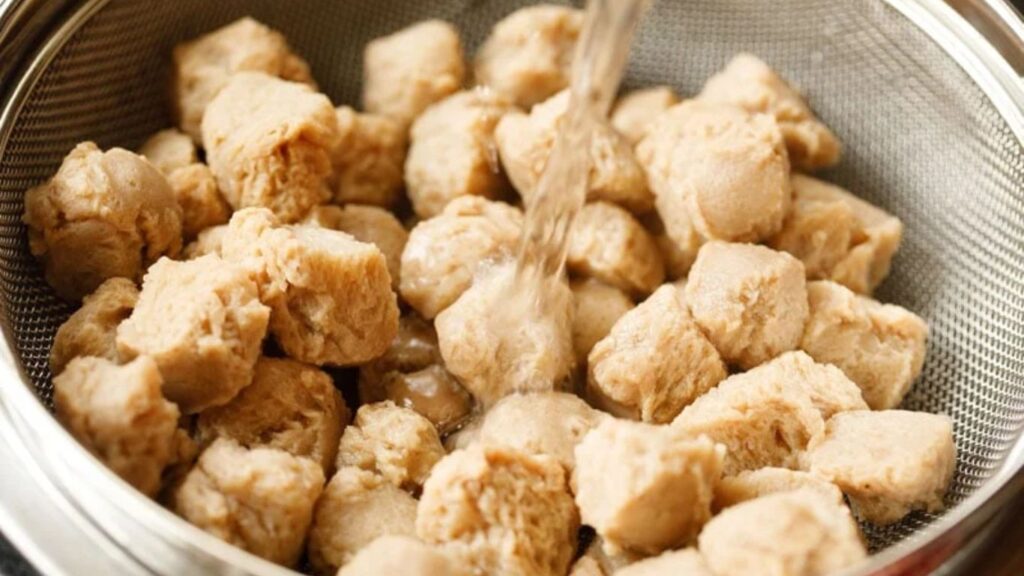Soy foods have emerged as a cornerstone in the realm of nutrition and fitness, captivating the interest of health enthusiasts and athletes alike. As the tide shifts towards plant-based diets, soy distinguishes itself as a formidable protein source, challenging the traditional dominance of animal-based proteins. This pivot reflects not only a growing consciousness towards environmental sustainability and ethical eating but also an acknowledgment of soy’s comprehensive nutritional benefits. In this context, soy’s role extends beyond merely serving as a dietary staple; it becomes a critical component in optimizing muscle growth and facilitating recovery post-exercise.
This blog aims to delve into the scientific underpinnings of soy consumption, unraveling how its unique nutritional profile can significantly impact muscle synthesis and recuperation. Through a blend of research findings and nutritional insights, we’ll explore the symbiotic relationship between soy intake and enhanced athletic performance, providing a blueprint for those looking to harness the power of plant-based proteins in their fitness journey.
How Soy Foods Influence Muscle Growth and Recovery
The Nutritional Profile of Soy Foods
Nutritional Content of Soy:
- Soy is a complete protein source, meaning it contains all nine essential amino acids necessary for human health.
- It is rich in both soluble and insoluble fiber, beneficial for digestive health.
- Soybeans are a good source of vitamins such as Vitamin B complex and Vitamin E, which play roles in energy metabolism and antioxidant protection, respectively.
- Minerals found in soy include calcium, magnesium, selenium, and iron, crucial for bone health, muscle function, immune support, and oxygen transport.
Protein Quality and Bioavailability:
- Soy protein is comparable to animal proteins in quality, with a high digestibility and bioavailability, making it an effective source for muscle repair and growth.
- The Protein Digestibility Corrected Amino Acid Score (PDCAAS) for soy protein is 1.0, the highest score possible, indicating its complete amino acid profile is well utilized by the body.
Comparison with Animal Proteins:
- Unlike some plant proteins, soy protein contains adequate amounts of the branched-chain amino acids (leucine, isoleucine, and valine), which are particularly important for muscle protein synthesis.
- Soy protein can be as effective as animal-based proteins in supporting muscle growth and recovery when consumed in sufficient quantities, offering a viable alternative for those seeking plant-based nutrition options.
Essential Amino Acids in Soy:
- The essential amino acids in soy, including leucine, are critical for triggering muscle protein synthesis, a key process in muscle recovery and growth.
- Soy’s balanced composition of amino acids supports not just muscle health but also overall physical well-being, making it a strategic choice for athletes and fitness enthusiasts alike.
Soy Protein and Muscle Growth

Muscle Growth Mechanism:
- Muscle growth, or hypertrophy, occurs through the repair of microtears in muscle fibers resulting from exercise, particularly resistance training. This process involves the synthesis of new proteins to repair and build muscle tissue, a response triggered by the stress of lifting weights or resistance exercise.
Role of Protein:
- Protein is crucial for muscle repair and growth. It provides amino acids, the building blocks needed for muscle protein synthesis (MPS). Adequate protein intake ensures the body has the necessary materials for muscle repair and growth.
Soy Protein and Muscle Hypertrophy:
- Studies have demonstrated soy protein’s effectiveness in supporting muscle hypertrophy, comparable to other high-quality protein sources like whey. For instance, a study published in the “Journal of the American College of Nutrition” found that soy protein supplementation can significantly contribute to increases in muscle mass, especially when combined with resistance training.
Comparison with Animal Proteins:
- Research comparing soy protein to animal-based proteins suggests that soy can offer similar benefits in terms of muscle mass gain and strength improvement, making it a viable option for athletes and fitness enthusiasts looking to incorporate plant-based proteins into their diets.
The Anabolic Window:
- The concept of the anabolic window suggests a period post-exercise (typically considered to be within 30 to 45 minutes) when the body is particularly receptive to nutrients, especially proteins, for optimal recovery and growth. Consuming protein during this time can maximize MPS and aid in quicker recovery.
Soy Foods Post-Workout:
- Soy foods, due to their high-quality protein content and the presence of essential amino acids, are ideal for consumption within the anabolic window. They provide the necessary nutrients to stimulate MPS, support recovery, and encourage muscle growth. Soy protein shakes, tofu, and edamame are excellent choices for post-workout nutrition, offering both convenience and nutritional value.
Soy Foods and Muscle Recovery

Muscle Recovery Post-Exercise:
- After exercise, the body initiates repair processes to heal microtears in muscle fibers, leading to muscle growth. Nutrition plays a crucial role in this recovery phase, providing the building blocks (amino acids) for muscle repair and nutrients that support overall recovery.
Nutrition’s Role:
- Adequate intake of proteins and carbohydrates post-exercise aids in muscle repair and replenishment of glycogen stores, respectively. Vitamins and minerals also support the recovery process by enhancing biochemical pathways involved in muscle regeneration.
Soy’s Anti-inflammatory Properties:
- Soy contains compounds with anti-inflammatory properties, such as isoflavones, which can help reduce inflammation in the body, thereby aiding in the muscle recovery process and reducing soreness.
Antioxidant Effects of Soy:
- The antioxidants in soy, including vitamins C and E and selenium, can help neutralize free radicals produced during intense exercise, protecting muscle cells from oxidative stress and aiding in faster recovery.
Research Findings:
- Studies have shown that soy protein consumption can reduce muscle damage markers and inflammation post-exercise, leading to a quicker recovery. For example, a study published in the “Journal of Nutrition” found that individuals consuming soy protein experienced less muscle soreness and faster recovery of strength post-exercise compared to those who did not.
Soy, Hormones, and Muscle Health
Misconceptions About Soy and Estrogen:
- A prevalent myth is that soy foods increase estrogen levels significantly due to their phytoestrogen content, potentially leading to hormonal imbalances in both men and women.
Phytoestrogens Explained:
- Phytoestrogens, particularly isoflavones found in soy, mimic estrogen but have a much weaker effect. Their impact on the human body is complex and often beneficial, rather than simply elevating estrogen levels.
Impact on Testosterone Levels:
- Studies have shown that soy consumption does not adversely affect testosterone levels. A comprehensive review published in the “Journal of the American Dietetic Association” found no significant effect of soy or isoflavone intake on testosterone levels in men.
Soy Consumption and Muscle Mass:
- Research indicates that soy protein can support muscle growth and maintenance similarly to animal-based proteins. Studies in both men and women have found that soy protein intake, in conjunction with resistance training, contributes positively to muscle mass and strength gains.
Health Impact of Phytoestrogens:
- The phytoestrogens in soy are associated with several health benefits, including reduced risk of heart disease and certain cancers. Their effect on hormone levels is not only benign but potentially protective, particularly in balancing hormone-related conditions.
Incorporating Soy into Your Diet for Muscle Gain

Incorporating Soy into Your Diet:
- Start by integrating soy milk into your breakfast cereal or smoothies as an easy swap for dairy milk, providing a high-quality protein start to your day.
Soy-Based Products:
- Tofu: Versatile and can be used in stir-fries, salads, or scrambles.
- Tempeh: Offers a meaty texture, ideal for sandwiches, grills, or as a salad topping.
- Edamame: Perfect as a snack or added to soups and salads for a protein boost.
- Soy protein powder: Can be used in shakes or smoothies for a post-workout protein hit.
Meal and Snack Ideas:
- Breakfast: Soy yogurt with granola and fruit.
- Snack: Roasted edamame or soy nuts.
- Lunch: Tofu stir-fry with vegetables and quinoa.
- Snack: Protein shake with soy protein powder, banana, and almond milk.
- Dinner: Tempeh tacos with avocado and fresh salsa.
Sample Day’s Meal Plan:
- Breakfast: Smoothie made with soy milk, soy protein powder, spinach, banana, and peanut butter.
- Mid-Morning Snack: A handful of roasted edamame.
- Lunch: Tofu and vegetable stir-fry over brown rice.
- Afternoon Snack: Soy yogurt topped with mixed berries and a sprinkle of nuts.
- Dinner: Grilled tempeh steaks with a side of sweet potato mash and steamed broccoli.
- Evening Snack: A glass of soy milk or a small soy-based protein bar.

Conclusion
Soy foods present a formidable ally in the quest for muscle growth and recovery, standing on par with traditional animal-based proteins. Through its high-quality protein, rich in essential amino acids, to its anti-inflammatory and antioxidant properties, soy supports not only the building of muscle mass but also swift recovery post-exercise. Dispelling myths surrounding soy and hormones, scientific evidence confirms its beneficial role in fitness regimes for both men and women. Incorporating soy into your diet offers a plant-based path to achieving your fitness goals, underlining the versatility and nutritional power of soy in supporting optimal muscle health.
Also read: Healthiest Foods for Breakfast
